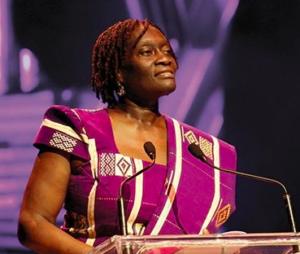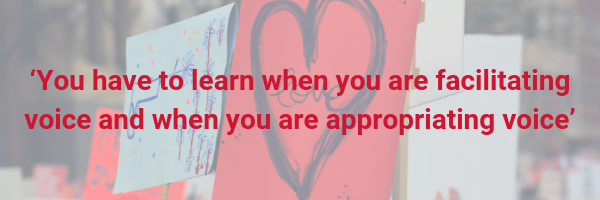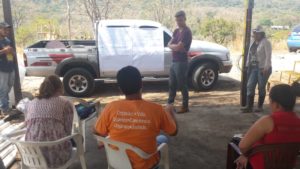Make Your Experiences Count. They Can Change the World.
LET’S BRING ALL OF OUR KNOWLEDGE AND EXPERIENCES TOGETHER.
TOGETHER WE KNOW MORE. TOGETHER WE ACHIEVE MORE. TOGETHER WE DO BETTER.
LET’S BRING ALL OF OUR KNOWLEDGE AND EXPERIENCES TOGETHER.
TOGETHER WE KNOW MORE. TOGETHER WE ACHIEVE MORE. TOGETHER WE DO BETTER.
Published: August 20, 2019

Theo Sowa during a TED Talk; Source: africanfeministforum.com
A few years ago I experienced how Theo Sowa, Ghanaian activist and feminist left a room full of representatives of northern donors and NGOS speechless and reflective with a powerful and critical speech. She pleaded to put local activists at the center of attention and requested a more humble role for northern donors and NGOS in international development. Until today I cherish and remind myself of her lesson: ‘You have to learn when you are facilitating voice and when you are appropriating voice’. In other words you have to ‘know when to step forward and when to step back’.
While the theory of putting the people on the ground in the driving seat is not mind boggling, in practice it is something most organizations and individuals working in international development are struggling with. For northern donors and NGOs it is important to keep in mind when developing policy frameworks, monitoring guidelines or evaluation indicators. For us TAs this dilemma is even more present on a daily basis, due to the hybrid nature of our job, in which we are collaborating daily with our partner organization, but not officially representing them.

It are therefore our daily struggles, doubts, observations and opinions, combined with our ambitions and good intentions that can make it tempting to appropriate voice, or step forward to do things ourselves. When challenges are arising, things are going on a slower pace, or things move in another direction than we had hoped for, we sometimes hope to speed things up by doing them ourselves or push things our way to get them into the ‘right’ direction. However, it is worth to double check, if we are not missing information in our analysis and seriously consider the option that we are the mistaken ones. Furthermore it is worth asking ourselves how things would turn out without our “divine” intervention.
This is not meant as an invitation to sit back and relax. In my opinion, the work of any NGO or individual in the field of international development is by nature interventionist, and therefore we should not be afraid to intervene as sometimes stepping forward is the right thing to do. Neither should we be reluctant to express opposing opinions or differing points of view. However, it is important not to confuse our opinion with the absolute truth, not to overestimate ourselves and not to underestimate others.
 TAs can be a valuable added value to an organization, as they can give new insights or bring new tools and knowledge to an organization. However, our presence here is temporary and the organization is there to stay. Therefore we have to remind ourselves to be humble, know when we are facilitating voice and when we are appropriating voice, know when to step forward and when to step back.
TAs can be a valuable added value to an organization, as they can give new insights or bring new tools and knowledge to an organization. However, our presence here is temporary and the organization is there to stay. Therefore we have to remind ourselves to be humble, know when we are facilitating voice and when we are appropriating voice, know when to step forward and when to step back.
So far for the theory,
Now let’s see how the practice works out for me.
Nice reflection! And very useful for our upcoming annual meeting! Would be nice if you could add the link of the TED talk
Thank you very much! The quotes itself are not coming from the TedTalk, but were done during a private civil society event in The Netherlands of which there is no footage. Nonetheless her TedTalk touches upon a similar topic and is very interesting too. https://www.youtube.com/watch?v=vEMcBFvL7PQ
Ok, thanks!
thank you for sharing, Floor! I liked it a lot!